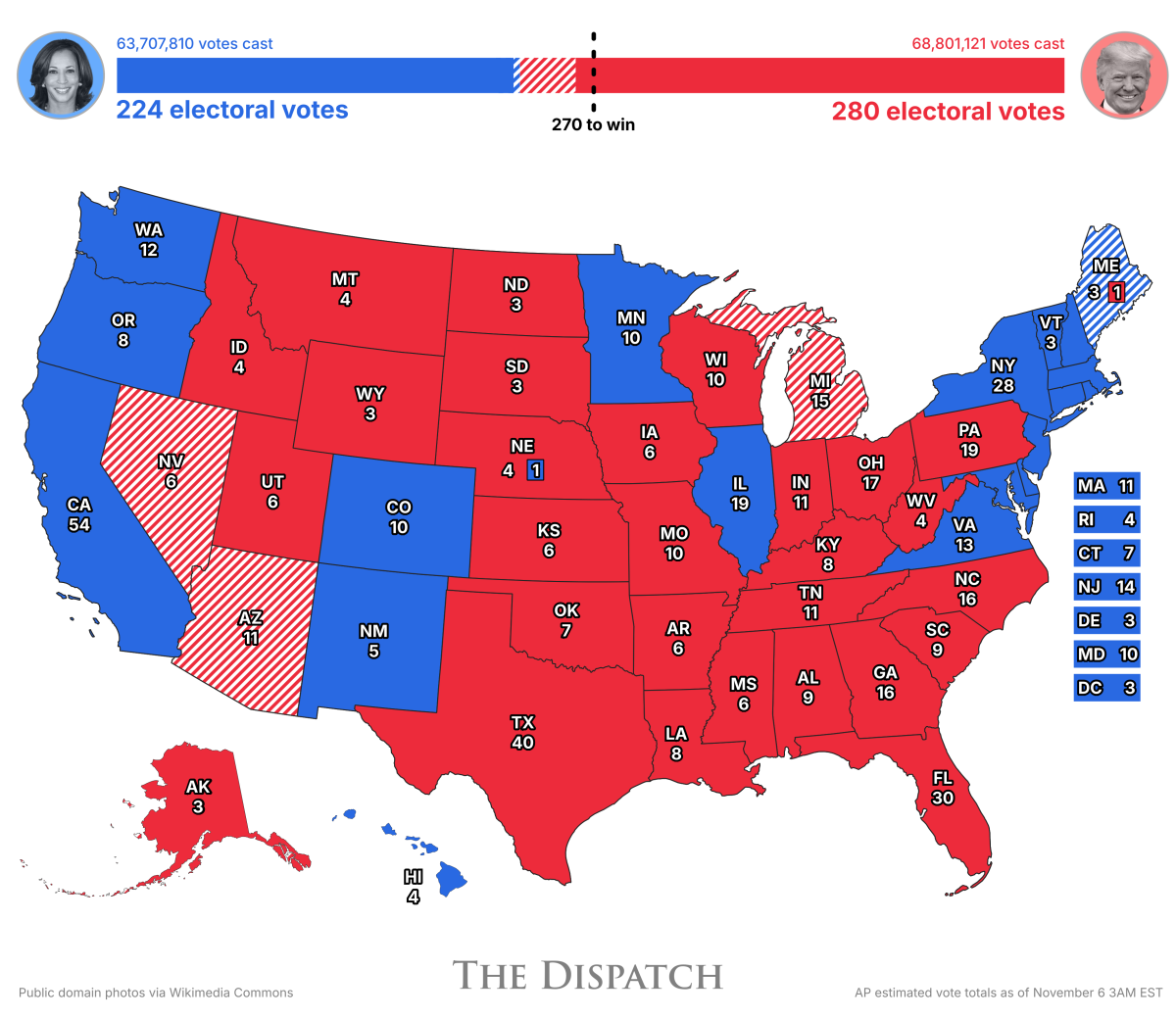Happy Wednesday! Of all the various contingency plans we had in place, “landslide in which we know the results within hours and no one contests them” was probably the election scenario for which we were least prepared.
The world will never see all the research we did into obscure recount procedures or the elaborate baton-passing operation we had in place with the Dispatch Politics guys in the event this thing dragged on for days.
Quick Hits: Today’s Top Stories
- Former President Donald Trump won the 2024 presidential election on Tuesday, securing what appears likely to be a decisive Electoral College—and popular vote—victory over Vice President Kamala Harris. As of 5:58 a.m. ET, the Associated Press had projected Trump to clinch 277 electoral votes, thereby securing the presidency—with Michigan, Nevada, Arizona, Maine, and Alaska not yet called. Trump addressed supporters in West Palm Beach, Florida, on Tuesday night, while Harris canceled a scheduled speech at an election night party. As of 6:30 a.m. ET, she has not yet conceded the race—at least publicly.
- Republicans are set to retake control of the Senate after spending four years in the minority, flipping Sen. Joe Manchin’s seat in West Virginia and Sen. Sherrod Brown’s seat in Ohio. Races in Montana, Wisconsin, Nevada, Michigan, Arizona, and Pennsylvania remained too close to call at the time of publication, but Republicans could very well exceed expectations and win several more seats, putting them within striking distance of a 56-seat majority.
- Control of the House of Representatives remained unclear at the time of publication, with dozens of races yet to be called. The Associated Press has projected Republicans to win 197 seats and Democrats to win 180, with most of the races yet to be called in California, Arizona, Washington, Oregon, and Nevada. Either party would need 218 seats to control the chamber.
- Republican Kelly Ayotte, a former U.S. senator from New Hampshire, easily defeated Democratic nominee Joyce Craig in the race to succeed Republican Gov. Chris Sununu. In North Carolina, Republican Lt. Gov. Mark Robinson—who CNN revealed had repeatedly made controversial comments on porn websites—lost his bid for the governorship to Josh Stein, the state’s Democratic attorney general. Republicans will soon control 27 governor’s mansions and Democrats 23.
- An amendment in Florida that would have enshrined a right to an abortion “before viability”—or about 24 weeks—in the state constitution failed, garnering approximately 57 percent of the vote but falling short of the 60 percent threshold needed to pass. In Nebraska, voters decisively approved a measure to amend the state’s constitution to prohibit abortion in the second and third trimesters, with exceptions for medical emergencies and pregnancies resulting from incest or rape. Nebraska voters also rejected a rival measure that would have enshrined in the state constitution a right to an abortion until viability. In Missouri, by contrast, voters narrowly approved a ballot measure ensuring the right to an abortion and overturning a previous ban.
- The FBI said Tuesday that polling places in four different battleground states—Georgia, Michigan, Arizona, and Wisconsin—received bomb threats yesterday, though none were considered credible. Georgia Secretary of State Brad Raffensperger told reporters on Tuesday that several non-credible bomb threats—many of which the FBI said originated from email addresses with Russian domains—were sent to Georgia polling places in Fulton and Gwinnett Counties in the suburbs of Atlanta. The threats briefly disrupted voting at several polling places, some of which were evacuated. Nine precincts extended voting hours to compensate for the disruptions related to the threats and problems with the voting equipment.
- Israeli Prime Minister Benjamin Netanyahu dismissed Defense Minister Yoav Gallant on Tuesday, saying that trust had “cracked” between the two in recent months. Gallant, a member of Netanyahu’s Likud party, cited three issues as the reason for his own firing: Gallant’s opposition to exemptions from military service for members of ultra-Orthodox Jewish sects, his emphasis on a ceasefire-and-hostage deal in Gaza, and his demands for an investigation into the security failures that led to the terrorist massacres of October 7, 2023. Foreign Minister Israel Katz, a Netanyahu ally with little military background, will replace Gallant.
- Capitol Police said early Tuesday afternoon that they had arrested a man during a security screening at the Capitol Visitor Center who they said smelled of fuel and was carrying a torch and flare gun. Tours were canceled for the rest of the day, and an investigation is ongoing.
Are you getting the most from your Dispatch membership?

Trump Secures Stunning Political Comeback

When former President Donald Trump—the once and current president-elect of the United States—took the stage in West Palm Beach, Florida, with his entourage early Wednesday morning, he was elated and perhaps a touch surprised that he had, in fact, done it again.
“We overcame obstacles that nobody thought possible, and it is now clear that we’ve achieved—it is now clear that we’ve achieved the most incredible political thing,” he said before exclaiming, “Look what happened! Is this crazy?”
Trump thanked the usual suspects—his wife, his children, his in-laws, his vice president-elect, J.D. Vance, and his campaign team, including Susie Wiles and Chris LaCivita. But in true Trumpian fashion, he also went on an extended riff about SpaceX owner Elon Musk’s rocket paint and golfer and supporter Bryson DeChambeau’s golf career. He even pulled Dana White, CEO of Ultimate Fighting Championship, to the mic to shout-out the podcasters that White said propelled Trump to victory.
And indeed, the former president won decisively on Tuesday, sweeping the southern swing states and looking likely to pick up two, if not all three, of the “Blue Wall” states of Pennsylvania, Michigan, and Wisconsin that helped him secure his first presidential victory eight years ago. Early exit polling—which is not infallible—suggests that Trump was likely carried to victory by one of the most racially diverse coalitions Republicans have ever seen. And on top of the Electoral College victory, the former president seems likely to win the popular vote for the first time in the three cycles his name has been on the ballot.

The waning hours of the 2024 presidential campaign were marked by “cautious optimism”—or “nauseous optimism,” as the case may be—from Vice President Kamala Harris’ team. Some on the left were even more bullish: David Plouffe, a senior adviser to the Harris campaign, said early on Tuesday there was a path to win all seven swing states.
The Trump team, by contrast, seemed—based on anonymous reporting—to be mentally prepared for a defeat and ready to point fingers. The knives were out in The Atlantic on Saturday, where Trump aides aired their grievances to Tim Alberta after the former president’s rally at Madison Square Garden late last month seemed poised to foil their efforts to turn out Latino men.
But when the cable news talking heads started reaching for the 2016 analogies in favor of comparisons to 2020 early on Tuesday, it was an early sign that things weren’t going the Democrats’ way. The best that Harris campaign manager Jen O’Malley Dillon could do in a memo to her team just after 11 p.m. ET was a tepid, “We’ve been saying for weeks that this race might not be called tonight.” At around 12:45 a.m., Harris campaign co-chair Cedric Richmond said in brief and dejected-sounding remarks at Harris HQ that the vice president wouldn’t be speaking to the crowd gathered at her alma mater, Howard University.
And just before 2 a.m. ET, Fox News became the first major network to call the 2024 presidential election for Trump.
As the Dispatch Politics crew explained last week, there were lots of ways Tuesday night could have gone—from a sweep by either candidate to the squeaker the polls always predicted. By the 9 p.m. hour, though, we could rule out a few possibilities: a Harris blowout or a Harris victory with a path carved through the South. The chances of a Democratic victory via the Blue Wall remained for a few hours but grew increasingly narrow as the night dragged on.
Ultimately, though, Trump improved on his 2020 showing virtually everywhere, swamping Harris early and thoroughly in the states she needed, breezing to victory on Tuesday night. Any surprise non-battleground upsets for Harris weren’t in the cards: Despite Ann Selzer’s late Iowa poll showing shocking signs of life for the Harris campaign in the Hawkeye State, the Associated Press called the state for Trump just before 11 p.m. Decision Desk HQ—the shop most aggressive in its calls—called North Carolina for the former president at 9:22 p.m., and Harris’ chances in Georgia looked increasingly slim as the night progressed and Trump banked votes in rural areas.
The former president performed well in key bellwether Georgia counties, including Baldwin. The rural county in central Georgia—where 40 percent of the residents are black—went for Biden in 2020, but Trump won it by 2 points, reflecting a more than 3.5-point gain on the Democratic margin in 2020. Likewise, in Nash County, North Carolina—a swingy exurb of Raleigh—Trump flipped the county back by two points after it went for Biden in 2020.
And so not for the first time for Democrats, it was all going to come down to Pennsylvania. The commonwealth had long been considered the most important battleground of the race, and it lived up to its reputation last night. Decision Desk HQ and Fox News called the state for Trump early Wednesday morning, busting the first hole in the Blue Wall that had become Harris’ only remaining path to victory. There, too, Trump improved on his 2020 performance, even in what the Harris campaign considered the must-win Philadelphia suburbs.
Across the country, exit polls show that the key to Trump’s gains was in a diverse coalition, particularly of black and Latino men. In Georgia and North Carolina, for example, exit polls found Trump carrying 20 percent of black men, significantly improving on his 2020 showing in both states. In Michigan, 35 percent of Latino voters sided with Harris, but more than 60 percent went for Trump. And in one of the more stunning results of the night, Trump won Starr County, Texas—a county with a more than 95 percent Hispanic population—by 16 points. The last time the county went for a Republican was in the election of 1892.
“U.S.-born Hispanic men are moving to the right faster than any other demographic in the country,” Mike Madrid, a political consultant and leading analyst on Latino voting patterns, said on last night’s Dispatch Live.
To boot, Harris underperformed dramatically even in safe blue states like New York, Illinois, and New Jersey. Biden won New York in 2020 by 23 points, but Harris was leading in the state by only 11 points as of publication time. Illinois almost looked semi-competitive, with Harris beating Trump by 8 points compared to Biden’s 17-point victory there in 2020. And the margin was even closer in New Jersey—a 6-point win for Harris, following a 16-point margin for Biden four years ago.
The last three-and-a-half months were replete with analyses and prognostications about potential missteps from the Harris and Trump campaigns. Did Harris potentially lose Pennsylvania—and by extension the entire race—by choosing Minnesota Gov. Tim Walz as her running mate instead of Pennsylvania Gov. Josh Shapiro? Did the Trump campaign make a mistake in outsourcing so much of their ground game to inexperienced third parties? Would Trump’s decision to select Vance as his running mate—at the behest of Tucker Carlson and high-powered Tech Bros—alienate independents and undecideds?
But yesterday’s results made clear that, at the end of the day, the fundamentals of the race were such that the election didn’t ultimately hinge on such questions. Roughly two-thirds of Americans thought that country was on the wrong track, and enough of them thought returning Trump to the White House was the best remedy for that condition. We’ll get a fuller picture of the election data in the coming days, but it seems likely that voters associating inflation and the border crisis with the incumbent administration—of which Harris is a part, despite her efforts to obscure that fact—and believing Trump could usher in greener economic pastures is at least partly responsible for the former president turning himself into the president-elect. To the extent that voters had concerns about Trump’s many liabilities—his behavior following the 2020 election culminating in January 6, his myriad legal woes, his brash personal conduct—most clearly prioritized other issues.
One of the bigger questions for Democrats left picking up the pieces after last night will be whether they could have won if they had been, to coin a phrase, unburdened by what had been. Joe Biden’s decision to run again—despite his clearly diminished capacity—will be heavily scrutinized. Might a different Democratic candidate, selected in an open and early primary, have been able to seal the deal? “I’ll feel as long as I gave it my all and I did the goodest job as I know I can do, that’s what this is about,” Biden said in July when asked how he’d feel if he stayed in the race and Trump won. In retrospect, it’s possible Democrats had already lost the election at that point: The size of Trump’s victory seems to suggest that no Democratic candidate—no matter how compelling—could have won the lightning campaign that Biden’s late exit forced.
Trump—and, it seems, the Republicans in the Senate—declared on Wednesday morning that “America has given us an unprecedented and powerful mandate.” All that remains is to see how they will use it.
Worth Your Time
- Craig Garnett, the publisher of the Uvalde Leader-News in Uvalde, Texas, reported on the tragedy at Robb Elementary School, when a shooter killed 19 students and 2 teachers on May 24, 2022. “The lives of the children and teachers who died there would have unfolded on the pages of his newspaper—their softball victories and graduation ceremonies making way for wedding announcements and barbecue cook-offs,” Elisabeth Egan wrote for the New York Times. “Instead, Garnett and his 12-person staff reported on their deaths, a tragedy that reshaped their town. While friends and neighbors were reeling, while lawmakers offered thoughts and prayers, the Leader-News staff put one word in front of the other, covering the shooting and mourning its seismic ramifications at the same time. They kept going when they learned that their colleague’s daughter was among the victims. They kept going when members of the national media went home.”
Presented Without Comment
Bloomberg: Tesla Soars as Musk’s All-In Bet on Trump Seen Reaping Rewards
Also Presented Without Comment
Reuters: Equatorial Guinea Orders Crackdown on Sex in Government Offices After Videos Leaked
Also Also Presented Without Comment
Daily Beast: MSNBC Feeds Steve Kornacki Fans’ Hunger With ‘Kornacki Cam’
In the Zeitgeist
Quincy Jones, the iconic producer who worked on albums for stars like Frank Sinatra and Michael Jackson and wrote scores for films and TV shows like The Wiz, The Color Purple, and Roots, died on Sunday. He produced this gem from Jackson’s Off the Wall, which is the zap of energy we need today (even though we’ve had enough):
Toeing the Company Line
- Mike Warren hosted our biggest-ever episode of Dispatch Live last night, joined by Jonah Goldberg, Steve Hayes, Sarah Isgur, Kevin Williamson, Megan McArdle, Noah Rothman, Stephanie Slade, David Frum, Sharon McMahon, Mike Madrid, David Kochel, Rob Stutzman, and many, many other insightful guests. Didn’t have a chance to tune in? The stream is available to all—not just Dispatch members—here.
- In the newsletters: The Dispatch Politics crew emptied their notebooks from the campaign trail, reporting on what voters told them they would do if their preferred candidate lost on Tuesday.
- On the site: Drucker reports from West Palm Beach on the festive mood at the Trump campaign’s election night party, while Charles details the lack of joy at the Harris campaign’s event at Howard University in Washington, D.C.
Let Us Know
What lessons do you think Democrats and Republicans will learn from last night’s election results? What lessons should they learn?








Please note that we at The Dispatch hold ourselves, our work, and our commenters to a higher standard than other places on the internet. We welcome comments that foster genuine debate or discussion—including comments critical of us or our work—but responses that include ad hominem attacks on fellow Dispatch members or are intended to stoke fear and anger may be moderated.
With your membership, you only have the ability to comment on The Morning Dispatch articles. Consider upgrading to join the conversation everywhere.